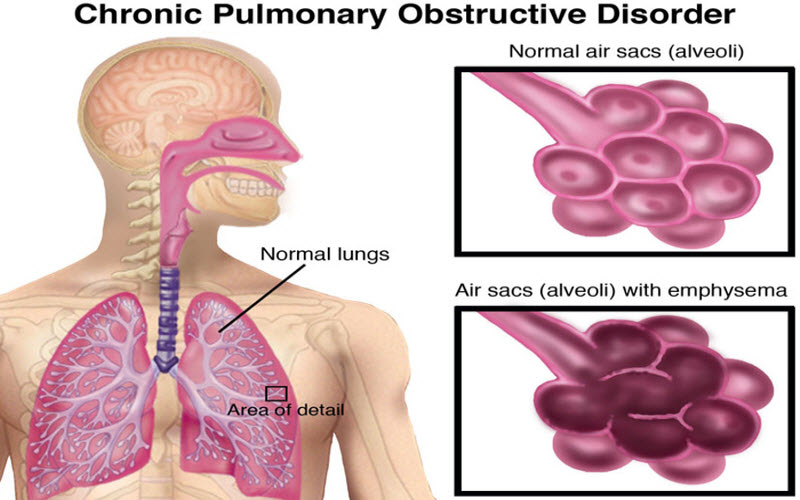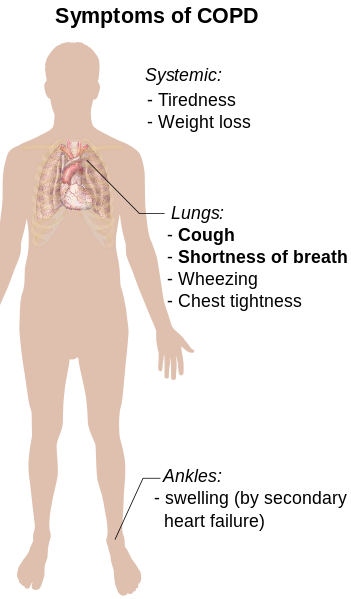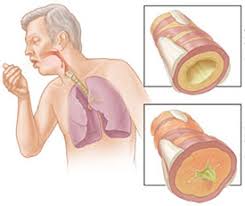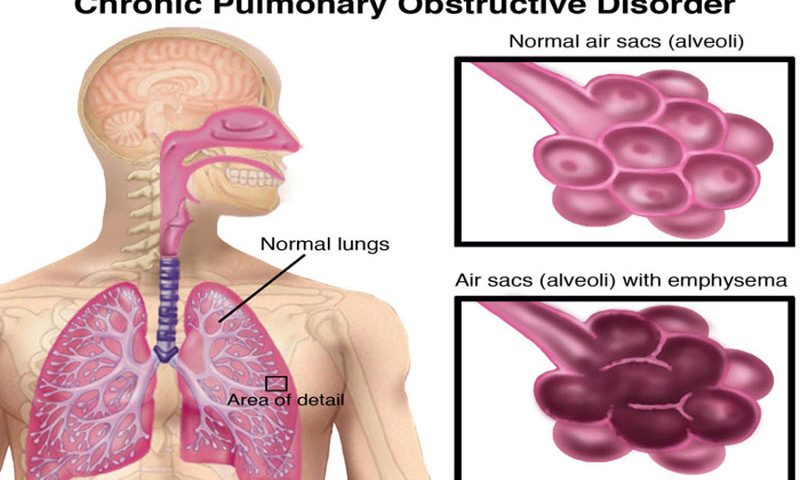This discussion includes the following information related to Chronic Obstructive Pulmonary Disease (COPD):
- Chronic Obstructive Pulmonary Disease or COPD
- Signs and Symptoms of Chronic Obstructive Pulmonary Disease (COPD)
- Causes of COPD
- Risk Factors for Chronic Obstructive Pulmonary Disease (COPD)
- Complications of COPD
- Tests and Diagnosis for COPD
- Treatment and Drugs for Chronic Obstructive Pulmonary Disease
Chronic Obstructive Pulmonary Disease (COPD) Definition

Chronic obstructive pulmonary disease (COPD) refers to a group of lung diseases that block airflow and make breathing difficult.
Emphysema and chronic bronchitis are the two most common conditions that make up COPD. Chronic bronchitis is an inflammation of the lining of your bronchial tubes, which carry air to and from your lungs. Emphysema occurs when the air sacs (alveoli) at the end of the smallest air passages (bronchioles) in the lungs are gradually destroyed.
Damage to your lungs from COPD can’t be reversed, but treatment can help control symptoms and minimize further damage.
Signs and Symptoms of Chronic Obstructive Pulmonary Disease

Symptoms of COPD often don’t appear until significant lung damage has occurred, and they usually worsen over time. For chronic bronchitis, the main symptom is a cough that you have at least three months a year for two consecutive years. Other signs and symptoms of COPD include:
- Shortness of breath, especially during physical activities
- Wheezing
- Chest tightness
- Having to clear your throat first thing in the morning, due to excess mucus in your lungs
- A chronic cough that produces sputum that may be clear, white, yellow or greenish
- Blueness of the lips or fingernail beds (cyanosis)
- Frequent respiratory infections
- Lack of energy
- Unintended weight loss (in later stages)
People with COPD are also likely to experience episodes called exacerbations, during which their symptoms become worse and persist for days or longer.
Causes of COPD

The main cause of COPD is tobacco smoking. However, in the developing world, COPD often occurs in women exposed to fumes from burning fuel for cooking and heating in poorly ventilated homes. Only about 20 percent of chronic smokers develop COPD. Some smokers develop less common lung conditions. They may be misdiagnosed as having COPD until a more thorough evaluation is performed.
How your lungs are affected
Air travels down your windpipe (trachea) and into your lungs through two large tubes (bronchi). Inside your lungs, these tubes divide many times — like the branches of a tree — into many smaller tubes (bronchioles) that end in clusters of tiny air sacs (alveoli). The air sacs have very thin walls full of tiny blood vessels (capillaries). The oxygen in the air you inhale passes into these blood vessels and enters your bloodstream. At the same time, carbon dioxide — a gas that is a waste product of metabolism — is exhaled.
Your lungs rely on the natural elasticity of the bronchial tubes and air sacs to force air out of your body. COPD causes them to lose their elasticity and partially collapse, which leaves some air trapped in your lungs when you exhale.
Causes of airway obstruction
- Emphysema: This lung disease causes destruction of the fragile walls and elastic fibers of the alveoli. Small airways collapse when you exhale, impairing airflow out of your lungs.
- Chronic Bronchitis: In this condition, your bronchial tubes become inflamed and narrowed and your lungs produce more mucus, which can further block the narrowed tubes. You develop a chronic cough trying to clear your airways.
Cigarette smoke and other irritants
In the vast majority of cases, the lung damage that leads to COPD is caused by long-term cigarette smoking. But there are likely other factors at play in the development of COPD, such as a genetic susceptibility to the disease, because only about 20 percent of smokers develop COPD.
Other irritants can cause COPD, including cigar smoke, secondhand smoke, pipe smoke, air pollution and workplace exposure to dust, smoke or fumes.
Alpha-1-antitrypsin deficiency
In about 1 percent of people with COPD, the disease results from a genetic disorder that causes low levels of a protein called alpha-1-antitrypsin. Alpha-1-antitrypsin (AAt) is made in the liver and secreted into the bloodstream to help protect the lungs. Alpha-1-antitrypsin deficiency can affect the liver as well as the lungs. Damage to the liver can occur in infants and children, not just adults with long smoking histories. For adults with COPD related to AAt deficiency, treatment options are the same as those for people with more common types of COPD. Some people can be treated by replacing the missing AAt protein, which may prevent further damage to the lungs.
Risk Factors for Chronic Obstructive Pulmonary Disease (COPD)
Complications of COPD include:
- Respiratory infections: People with COPD are more susceptible to colds, the flu and pneumonia. Any respiratory infection can make it much more difficult to breathe and produce further damage to the lung tissue. An annual flu vaccination and regular vaccination against pneumococcal pneumonia help prevent some infections.
- High blood pressure: COPD may cause high blood pressure in the arteries that bring blood to your lungs (pulmonary hypertension).
- Heart problems: For reasons that aren’t fully understood, COPD increases your risk of heart disease, including heart attack.
- Lung cancer: Smokers with chronic bronchitis have greater risk of developing lung cancer than do smokers who don’t have chronic bronchitis.
- Depression: Difficulty breathing can keep you from doing activities that you enjoy. And dealing with serious illness can contribute to development of depression. Talk to your doctor if you feel sad or helpless or think that you may be experiencing depression.



